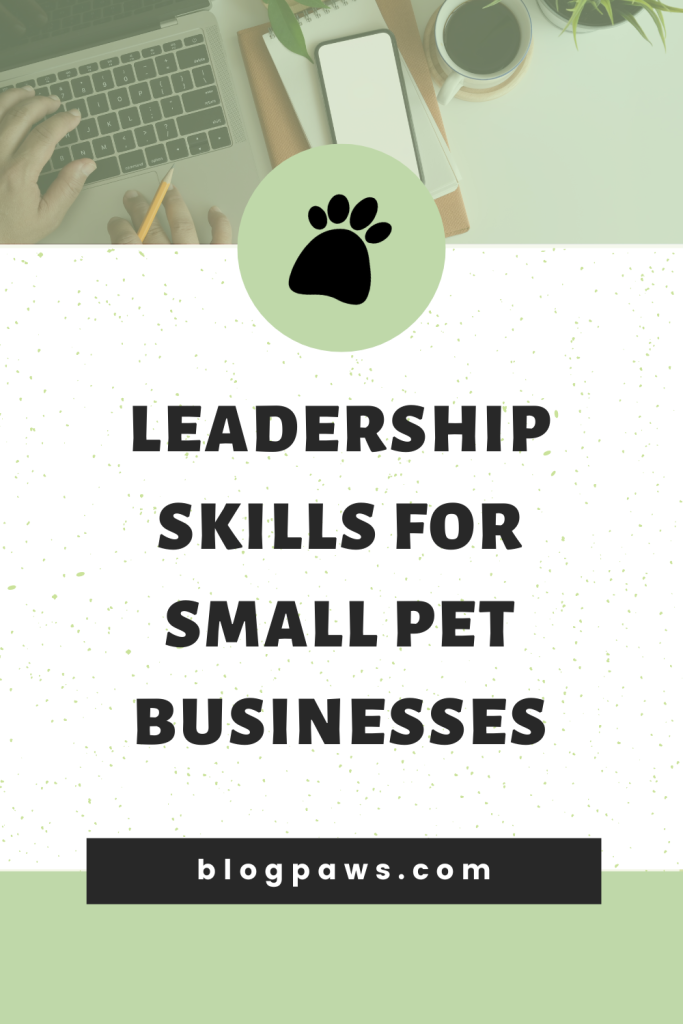Leadership Skills For Small Pet Businesses
Leadership has been a buzzword for years, probably decades, but it can be hard to figure out how to develop your leadership skills when you are a small pet business owner with an employee of one: you.
It can feel like you are only leading yourself, which makes the idea of leadership difficult to embrace. However, your leadership is something that can attract clients, customers, followers, and/or readers. It can help your business rise above the noise and create loyal followers and fans.
First, let’s define what we mean when we say leadership.

What is leadership for small businesses?
Leadership for a small pet business means having a clear vision that you share with the world. Your passion is something that drives you and it should be something that others connect with so that they are following your lead. That applies to your contractors, your vendors, your customers/clients/readers/followers – pretty much anyone you come in contact with.
Even if you do not have a team, you do engage with others in your day to day business life. How you engage with each of them will help (or hurt) your business leadership skills.
When I think of the best small business leaders I know, they have a few things in common.
5 Leadership Traits For Small Pet Businesses
- They are great listeners. Part of being a good leader is making sure you listen to others and understand their perspectives. It does not always mean agreeing with their perspective, but it does mean understanding it.
- They are patient. Good leaders will get passionate and excited and may move quickly with ideas, but they also know when they need to hit pause and make sure to consider all aspects. And when someone disagrees with them, they don’t snap. They give space for the other idea or perspective without harshness or rashness.
- They are humble. They focus on lifting others up and keeping things positive, even when things are hard. That doesn’t mean they are oblivious to the negative, but it does mean they help it be processed so that everyone can move past it.
- They make mistakes and own them. No one is perfect. No one is always right. No one knows everything. Great leaders know this and know when to ask for help and when to admit they made a mistake.
- They learn how to say no. Notice that says “learn how” and not “know how.” I don’t know any great leader who doesn’t sometimes say “yes” to something they wish they had said “no” to, but all the great leaders I know are always working and improving on this. It’s not uncommon to want to do ALL the things. It often feels better to say “yes” than it does to say “no,” at least initially, but learning your boundaries is an important leadership skill.
Of everything we listed, notice how none of it is about hard skills? Great leaders might be wizards at Excel or copywriting, but those things do not make them great leaders. Soft skills make great leaders.
3 Ways Leadership Skills Grow Your Business
1. When you stand for something, you take the lead.
One thing we consistently see with small pet businesses is that they have passion. Lots of passion. That passion comes from some beliefs that you hold very close, which makes you a leader in your space.
When new people find you and read your about page or see how you share your products or relate to the content you share because it aligns with their perspective on a topic, they see you as a leader. They see you as someone who cares about what they care about so much that you share it as part of your brand.
If you haven’t created values or belief statements, take some time to put your beliefs into written form and share them. By sharing your beliefs/values, you are taking a stance for something. By taking a stance for something you become a leader.
2. When you help another business owner, you take the lead.
We are big proponents of community here at BlogPaws. Both large communities and smaller ones alike. Both have immense value, which is why we have both: the free BlogPaws Community Facebook group is larger and the All Pet Collaborative paid membership group is smaller. Both exhibit two things we believe greatly in: being supportive and inclusive.
Becoming part of a community means creating a support system. Sometimes you are the support and sometimes you need the support. Anytime a fellow business owner asks for help or guidance and you step in to answer the call, you take the lead.
If you have a question and another person from your support system has the answer, you are still a great leader because you know when to ask for help. Your request for assistance will probably be addressed quickly as a great leader because others have seen how much you have helped in the past.
Leadership in your community of other small pet businesses means listening, learning, and assisting when you are able so that others see that you are someone to look towards.

3. When you build your own community, you take the lead.
We just touched on being a part of a business community, which is important in your small business leadership. But no less important is embracing the idea that your business is building its own community of customers/clients/readers.
When you are the one building the community, you are always the leader and your leadership is highly valuable to your community.
Your community will look to you for answers, for guidance, for solutions, and for approval. That can mean anything from a question about how to do something they’ve seen you do such as growing an Instagram following or addressing a concern they have with your product or another member of your community.
Your community supports you because they believe in what you are doing. The 5 skills we mentioned above all come into play here. The best leaders build great communities because they understand how to lead them.
Leadership as a small pet business owner may not look the same as an entrepreneur with a team, but the skills are still the same. In both cases being a great leader can improve your business relationships, your community, and grow your business.
Who are some of the great small business leaders you look to in the pet industry?
About the Author: Chloe DiVita, BlogPaws CEO, has 15+ years of experience in digital marketing, the pet industry, and as a greyhound mom. She’s earned accolades like, Pet Age’s 40 Under 40 and Muse Medallions from the Cat Writers’ Association. Formerly Executive Producer for TEDxCambridge, she brings storytelling and public speaking to her work with creators, leaders, and brands. Read more…







Great read! Running a small pet business comes with its own challenges, and these leadership tips are spot-on for building a strong, successful team.